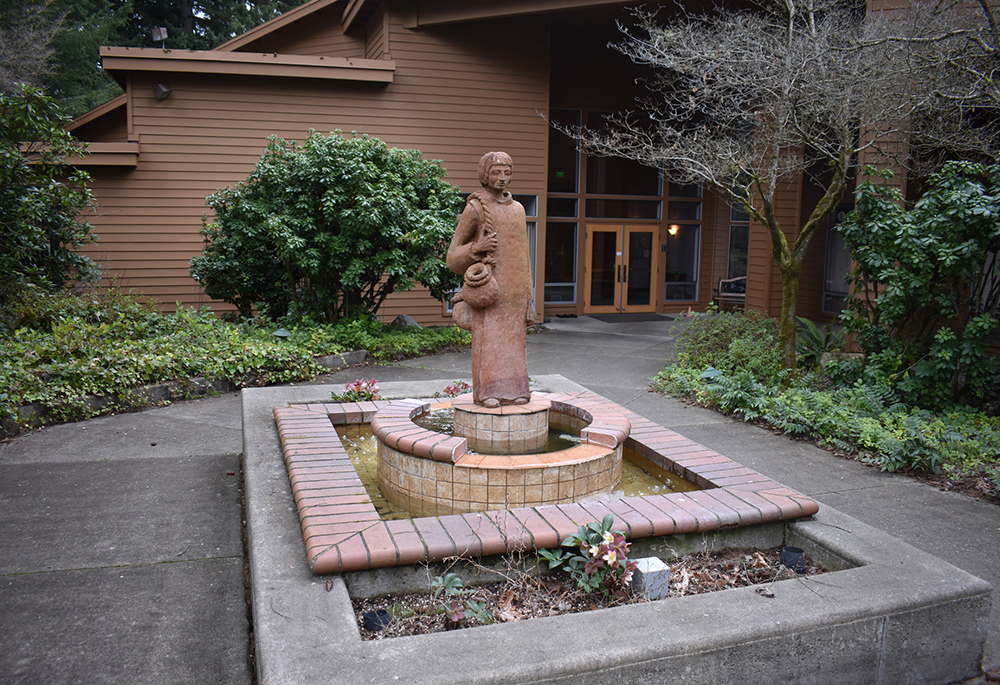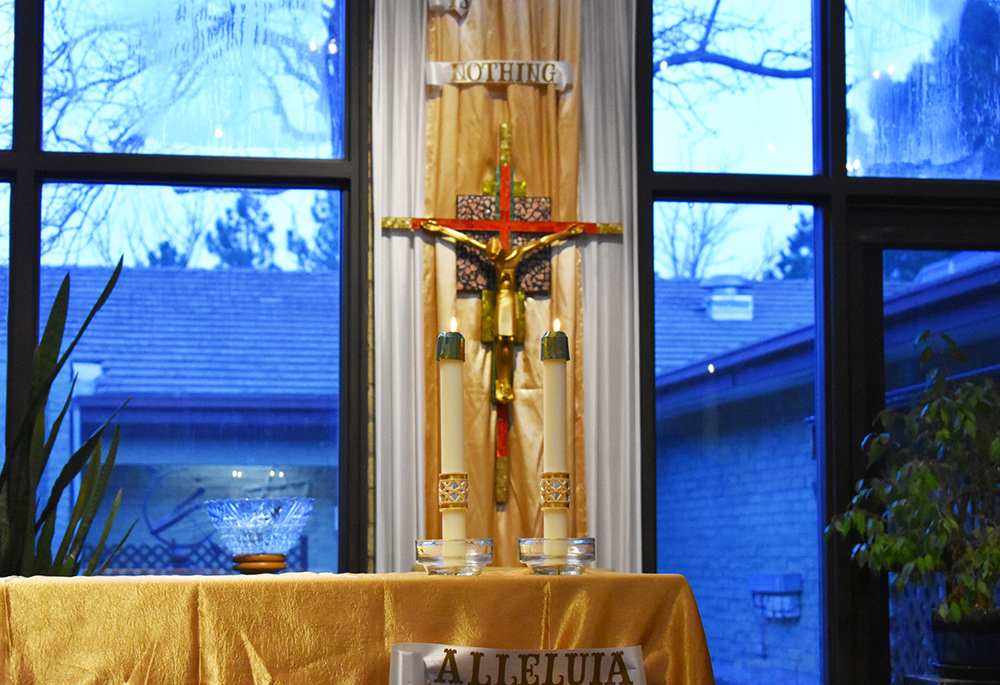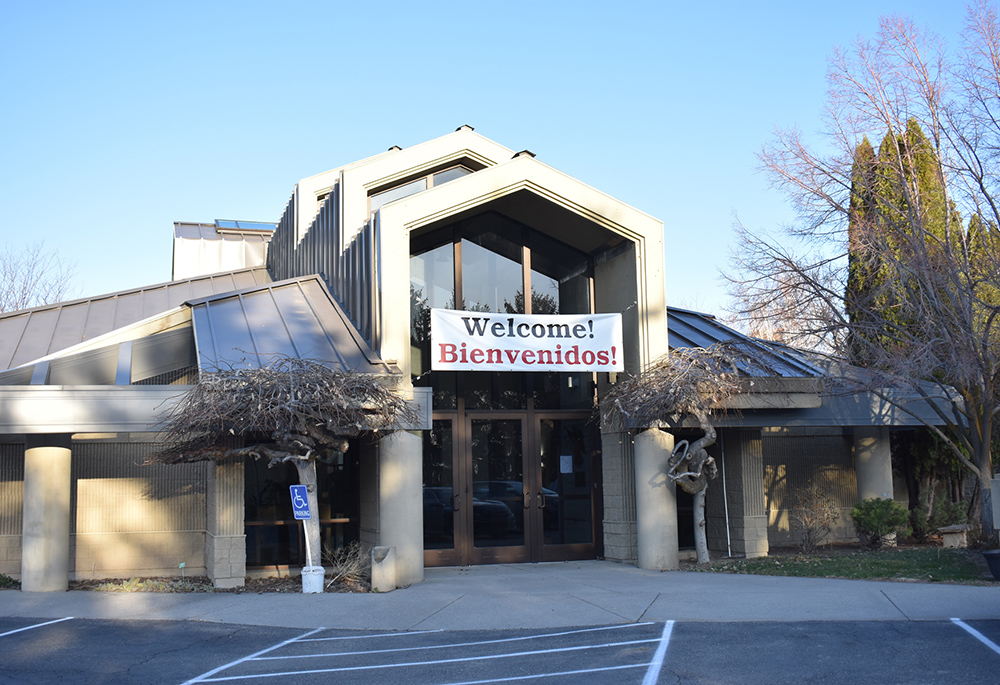
A statue of St. Placid welcomes visitors and guests at the entrance of St. Placid Priory, Lacey, Washington. (Julie A. Ferraro)
Chapter 53 of the Rule of St. Benedict begins, "All guests who present themselves are to be welcomed as Christ, for he himself will say: I was a stranger and you welcomed me (Matthew 25:35)."
Through many centuries, those who follow Benedict's Rule have given high priority to this mandate — including Cistercians, Camaldolese and Trappists. Most monasteries have a guesthouse or guest wing, where visitors are greeted and offered hospitality, albeit to varying degrees.
Returning from my recent vacation, as I unpacked my oversized blue-floral shoulder bag (I travel light!), I experienced a rather profound realization: my travels over much of the past 30 years have revolved around visits to Benedictine monasteries!
Some folks might believe that an itinerary involving stays at a series of monasteries would get boring after a while. I can attest that such is not the case.

The chapel at the Monastery of the Ascension, Jerome, Idaho, looks out upon the monks' enclosed garden. (Julie A. Ferraro)
Yes, a common aspect of the monasteries I've visited is the balance between prayer, work and study for those who have gathered into community and professed the vows of stability, obedience and fidelity to the monastic way of life. How that is manifested, though, is unique within each set of walls.
This is evident when joining in the Liturgy of the Hours — or Divine Office — in chapels that range from stark to ornate, classical to modern. The monks at Prince of Peace Abbey in Oceanside, California, solemnly enter the chapel in rows of two in a procession traditionally known as "statio." They first bow to the tabernacle and then to each other before proceeding to their stalls. The sisters at St. Placid Priory, Lacey, Washington, sit in rows of chairs, facing each other.
This form of prayer has a common format of hymns, psalms, readings, petitions and the Lord's Prayer, but the variations on this theme are unique to each monastery. I've discovered a two-week cycle, in which all 150 psalms are chanted — or recited — at Gethsemani Abbey in Kentucky. The sisters at Our Lady of Grace Monastery in Beech Grove, Indiana, use an inclusive language translation of the psalms in a four-week cycle.

A large banner welcomes all who visit the Monastery of the Ascension, Jerome, Idaho. (Julie A. Ferraro)
In 2020, when I wrote an article on the variations of the Liturgy of the Hours created by the Franciscans, Dominicans, Mercy Sisters, and Ursulines, I briefly mentioned how the Benedictines adapt this prayer form to each individual monastery. A thorough study of this tradition could fill volumes with the rationale for the choices made.
For example: monasteries with musically trained members will incorporate psalm tones composed "in-house." Others will seek permission to share songs and chants developed within the monastic congregation — a group of independent monasteries affiliated on both an administrative and canonical level.
Some monasteries pray the psalms in Latin; others blend chant with recitation.
The list could go on, and it's but one aspect of what makes visiting Benedictine monasteries on my vacation a treat.
The location of a Benedictine monastery contributes to its "flavor," if you will. The Monastery of the Holy Cross started life as a parish church in the heart of Chicago, and the monks have renovated the property into a place of peace in the midst of the hustle and bustle of big-city life. Mount St. Scholastica, in Atchison, Kansas — where I previously worked in communications — boasts a quieter atmosphere in the small-town Midwest, with ample space for walking or sitting on a bench beneath a shade tree, beehives and extensive gardens filled with vegetables.
Remote monasteries, such as St. Meinrad Archabbey in southern Indiana, present a travel challenge, with the nearest airport 60 miles distant and winding country roads. However, they offer a marvelous library and the opportunity to meet those studying for ministry at the school of theology.
Advertisement
As for the Center for Benedictine Life at the Monastery of St. Gertrude, where I live in community with the sisters as the Rule continues to be applied to 21st century needs, more than a thousand acres of land allow for unrivaled views of the Camas Prairie and the glory of all creation. During my recent vacation, I spoke with people who were unaware a place called Cottonwood exists. It's a great destination to experience the singular practice of this Benedictine community — though I might be a little biased.
Perhaps, next time you plan a vacation, consider visiting a Benedictine monastery. There, you'll find not only a break from the hectic day-to-day routine, but also hospitality surpassing that of even 5-star hotels and a prayerful environment offering rest for your soul.





